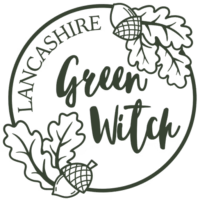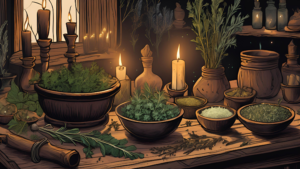Introduction to Herbs: Unlock Magical Herbal Power
Herbs have been cherished across cultures and centuries for their healing, culinary, and spiritual properties. In witchcraft, they play an essential role in rituals, spells, and daily practices, acting as a bridge between the natural and the mystical. This blog explores the profound significance of herbs, offering an overview of their uses and the wisdom they bring to magical practices.
Why Are Herbs So Important in Witchcraft?
Herbs are potent tools in witchcraft for several reasons:
- Connection to Nature: Herbs ground us in the cycles of the Earth, enhancing our bond with nature.
- Symbolism and Energy: Each herb carries unique energies, allowing witches to select plants that resonate with their intentions.
- Versatility: Herbs can be used in teas, incense, sachets, oils, and as altar decorations, making them indispensable in magic.
Common Ways to Use Herbs in Magic
Understanding how to work with herbs is fundamental to crafting effective spells and rituals. Here are some popular uses:
- Spell Sachets: Fill a small pouch with herbs that correspond to your intentions—lavender for peace, rosemary for protection, or basil for prosperity.
- Herbal Infusions: Brew teas or create baths infused with herbs to cleanse, heal, or attract specific energies.
- Incense and Smoke Cleansing: Burn herbs like sage, mugwort, or cedar to purify spaces and invite positive vibrations.
- Altar Decorations: Adorn your altar with fresh or dried herbs to represent specific elements or deities.
- Oils and Tinctures: Create herbal oils to anoint candles, tools, or yourself, amplifying your magical work.
The Magical Properties of Popular Herbs
Each herb has its own unique magical properties. Here’s a quick guide to some of the most beloved herbs in witchcraft:
- Lavender: Promotes calm, peace, and restful sleep.
- Rosemary: Offers protection, cleansing, and memory enhancement.
- Basil: Attracts prosperity, love, and harmony.
- Mugwort: Enhances intuition and aids in divination.
- Peppermint: Invigorates energy and promotes healing.
Creating Your Own Herb Garden
Growing your own herbs is a rewarding way to connect with nature and infuse your magical practice with fresh energy. Follow these steps to cultivate a magical herb garden:
- Select Your Herbs: Choose plants that align with your magical goals, such as chamomile for relaxation or thyme for courage.
- Bless Your Garden: Perform a simple blessing ritual, asking for growth and abundance.
- Harvest Mindfully: Always thank the plant for its gift and take only what you need.
Incorporating Herbs into Rituals
Herbs can enhance rituals by adding layers of intention and energy. For example:
- New Moon Rituals: Use herbs like jasmine or sandalwood to set intentions for growth.
- Full Moon Rituals: Incorporate lavender or chamomile to celebrate completion and release.
- Seasonal Sabbats: Decorate with seasonal herbs like holly for Yule or sage for Samhain.
Crafting a Simple Herbal Spell
What You’ll Need:
- A small sachet or pouch
- Lavender (for peace)
- Rosemary (for protection)
- Basil (for abundance)
Steps:
- Combine the herbs in the sachet.
- Hold the pouch in your hands, focusing on your intention.
- Say: “Herbs of the Earth, powerful and true, Bring peace, protection, and abundance through.”
- Keep the sachet close to you or place it in a sacred space.
Connecting Herbs to Deities and Elements
Many herbs are associated with specific deities and elements:
- Deities: Mint is linked to Hecate, while roses are sacred to Aphrodite.
- Elements: Cinnamon represents fire, while willow aligns with water. Use these connections to deepen your rituals and honour divine energies.
Herbs in Divination and Meditation
Incorporating herbs into divination practices can heighten clarity and insight. For example:
- Mugwort Tea: Drink before scrying or tarot readings to enhance psychic abilities.
- Burning Bay Leaves: Write a question on a bay leaf and burn it, focusing on receiving guidance.
Ethical Harvesting and Sustainability
As practitioners, it’s crucial to respect nature and harvest herbs ethically. Follow these guidelines:
- Harvest only what you need, leaving enough for the plant to thrive.
- Avoid endangered herbs and seek sustainable alternatives.
- Offer thanks to the Earth for its bounty, perhaps through a small offering or prayer.
My Personal Journey with Herbs
Herbs have always been a cornerstone of my magical practice. From the soothing scent of lavender to the protective energy of rosemary, these plants guide and support me daily. Whether I’m crafting a spell or simply enjoying the beauty of my herb garden, I feel a profound connection to nature and its wisdom.
Final Thoughts
Herbs are more than just plants—they are powerful allies in magic, offering wisdom, energy, and a tangible link to the natural world. Whether you’re a beginner or a seasoned practitioner, exploring the magical properties of herbs can enrich your practice and deepen your connection to the Earth.

